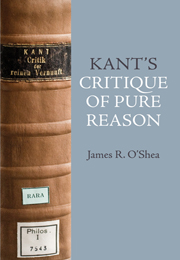Book contents
- Frontmatter
- Contents
- Preface
- INTRODUCTION
- 1 METAPHYSICS AND THE “FIERY TEST OF CRITIQUE”
- 2 WAKING FROM DOGMATIC SLUMBERS: HUME AND THE ANTINOMIES
- 3 SPACE AND TIME AS FORMS OF HUMAN SENSIBILITY
- 4 THE CATEGORIES OF UNDERSTANDING AND THE THINKING SELF
- 5 ONE LAWFUL NATURE
- 6 CONCLUSION: PURE REASON'S ROLE IN KANT'S METAPHYSICS OF NATURE
- Bibliography
- Index
INTRODUCTION
- Frontmatter
- Contents
- Preface
- INTRODUCTION
- 1 METAPHYSICS AND THE “FIERY TEST OF CRITIQUE”
- 2 WAKING FROM DOGMATIC SLUMBERS: HUME AND THE ANTINOMIES
- 3 SPACE AND TIME AS FORMS OF HUMAN SENSIBILITY
- 4 THE CATEGORIES OF UNDERSTANDING AND THE THINKING SELF
- 5 ONE LAWFUL NATURE
- 6 CONCLUSION: PURE REASON'S ROLE IN KANT'S METAPHYSICS OF NATURE
- Bibliography
- Index
Summary
Immanuel Kant (1724–1804) was perhaps the most profound thinker of that period of modern history known as the Enlightenment, or the Age of Reason. Kant has also arguably been the philosophical figure who has had the greatest overall influence on the subsequent development of Western philosophy from the late eighteenth century to the present day. This introduction will provide just a few details of Kant's biography and discuss some of the more important intellectual influences on his philosophical development, followed by a few remarks on the text of the Critique of Pure Reason. The proper explanation of Kant's philosophical views and of such terms used below as ‘metaphysics’, ‘a priori knowledge’, ‘rationalism’ and ‘empiricism’ will begin in Chapters 1 and 2. For an in-depth and up-to-date biography of Kant, one that simultaneously makes for good reading and explains Kant's personal and philosophical development, I particularly recommend Manfred Kuehn's Kant: A Biography (2001), to which I am indebted here; and see also Ernst Cassirer's earlier Kant's Life and Thought ([1918] 1981).
A BRIEF SKETCH OF KANT'S LIFE AND THE HISTORICAL CONTEXT
‘Emanuel’ (later changed by Kant to ‘Immanuel’) Kant was born on 22 April 1724, in the city of Königsberg, which today is Kaliningrad, Russia, located on the Baltic Sea between Poland and Lithuania. During Kant's life, Königsberg was the capital of East Prussia under the rule of Frederick William I, King of Prussia until 1740, whose reign was followed by Frederick II (‘Frederick the Great’) until 1786, Frederick William II until 1797, and Frederick William III until 1840.
- Type
- Chapter
- Information
- Kant's Critique of Pure ReasonAn Introduction and Interpretation, pp. 1 - 12Publisher: Acumen PublishingPrint publication year: 2011



